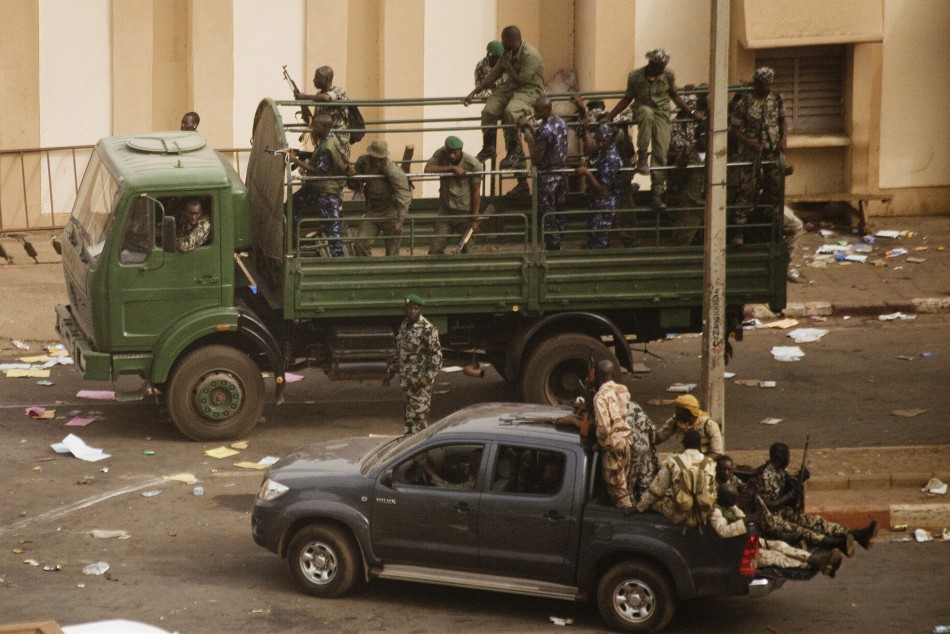Mali Coup Mutineers Hold PM Kaidama among Three Ministers


Leaders of a military coup against Malian President Amadou Toumani Touré looted the presidential palace, amid reports that they are holding several members of his government.
The soldiers are said to have arrested and taken into custody at least three government members, including Prime Minister Cissé Mariam Kaïdama Sidibé, foreign minister Soumeylou Boubèye Maïga and Kafougouna Koné, minister of territorial administration.
It is thought the politicians were being held at a military camp in Kati, around 12 miles from the capital Bamako.
The whereabouts of the ousted democratically elected president are unknown, but the coup leader, Captain Amadou Haya Sanogo, said on state television that Touré was "doing well and is safe".
After storming the presidential palace, the rebels dissolved Mali's constitution and democratic institutions, along with imposing a military curfew and closing the country's borders.
They have formed a group called the National Committee for the Restoration of Democracy and State (CNRDR), which promised to hand back power to a democratically-elected president as soon "as the country is reunified and its integrity is no longer threatened".
"The CNRDR, representing all the elements of the armed forces, defensive forces and security forces, has decided to assume its responsibilities and end the incompetent and disavowed regime of Amadou Toumani Touré," the group said in a statement. "The objective of the CNRDR does not in any way aim to confiscate power and we solemnly swear to return power to a democratically-elected president as soon as national unity and territorial integrity are established."
At least three people were killed in the coup and 28 were injured.
Soldiers from CNRDR said they staged the mutiny because the government did not give them enough arms to tackle a rebellion by ethnic Tuareg in the north of the country, which has forced up to 200,000 people from their homes.
More than 100,000 residents have fled to neighbouring countries, such as Algeria, Niger, Mauritania and Burkina Faso.
In addition to the African Union and the Economic Community of West Africa States (Ecowas), the West African regional bloc, neighbouring countries warned for months that weapons from the Libyan conflict were increasing regional instability and risks of a coup being staged.
International Condemnation
President Toure is a former army parachutist who in came to power in a 1991 coup. He surprised the population by handing power to civilians, becoming known as the "soldier of democracy".
In 2002 he returned to power after being elected president. He was re-elected for a second term in 2007 and was expected to step down next month, when his term in office ended.
Amnesty International has condemned the coup.
"We call on the soldiers who have staged this coup to release immediately the political leaders and to prevent any violation of human rights and to restore the rule of law," the organisation said in a statement.
"With the suspension of all the legal institutions and the curfew that has been imposed, all the basic safeguards for the respect of human rights have been put on hold," Amnesty West Africa researcher Gaëtan Mootoo said.
"The situation is grave for our democracy and our republican institutions," said Ali Nouhoum Diallo, former president of Mali's National Assembly. "We cannot approve the seizing of power through force."
The last statement from the president, posted on Twitter from the government's official account, read "This is not a coup. It's just a mutiny."
The UN Security Council has also condemned the move.
Security Council members "strongly condemn the forcible seizure of power from the democratically-elected government of Mali by some elements of the Malian armed forces," a statement said.
The communiqué also called on "the release of all detained Malian officials" and the "immediate restoration of constitutional rule and the democratically elected- government".
The African Union (AU) issued its own statement, saying Jean Ping, the head of the organisation "strongly condemns this act of rebellion, which seriously undermines constitutional legality and constitutes a significant setback for Mali and for the ongoing democratic processes on the continent".
The union said it was holding talks with Ecowas and other regional actors.
© Copyright IBTimes 2025. All rights reserved.





















